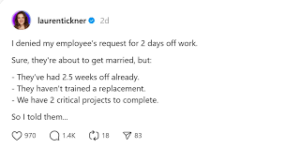A social media post by Lauren Tickner, CEO of London-based Scale Systems, has ignited significant controversy after she revealed her decision to deny an employee’s request for two days of leave following their marriage. The post, made on Threads, quickly drew criticism, prompting a fierce debate over workplace policies and expectations.
The Controversial Claim
In her initial post, Tickner stated, “I denied my employee’s request for 2 days off work. Sure, they’re about to get married, but: – They’ve had 2.5 weeks off already; they haven’t trained a replacement; we have 2 critical projects to complete.” She further emphasized the company’s unlimited time-off policy, advising the employee to “find a replacement” and train them on daily tasks.

HAVE A LOOK AT THE VIRAL POST:
Post by @laurenticknerView on Threads
This statement led to an immediate backlash, with many netizens labeling her response as unreasonable. Critics questioned the expectation that an employee should find their replacement and accused her of being out of touch with employee welfare.
Public Reactions
Comments on her post ranged from disbelief to outrage. One user stated, “As a manager, I would never. This is condescending and manipulating. ‘Find your replacement?’ What kind of response is that?” Another commented, “Isn’t finding a replacement your responsibility? Typical corporate lunatic.” Many felt that her stance highlighted a larger issue regarding corporate culture and employee rights.
ALSO READ: CEO Blames ‘Poverty Thinking’: Stop ‘Playing The Victim’, Poor People Becomes Poorer
Clarifying the Misunderstanding
In response to the uproar, Tickner later took to the platform to clarify her position regarding flexible time off. She explained, “It’s called Flexible Time Off. (The opposite of micromanagement & outdated policies). Your employees set their own hours; they work where they want; they take days off when they choose.” Tickner elaborated on her approach, suggesting that flexible time off fosters trust among teams and encourages accountability.
She clarified her comments about finding a replacement, stating, “When I say ‘find a replacement and train them on your daily to-dos,’ I literally meant: show them your checklist and have them follow it. Everything is documented.” Tickner emphasized that the company has processes in place to ensure tasks can be managed in the absence of an employee, and that such procedures create a more efficient working environment.
Mixed Reactions Persist
The engagement on Tickner’s posts remained mixed, with some users praising her for her explanation and others criticizing her for being misleading. One user remarked, “The way you’ve explained it here does make sense, however, in your original post you said twice that training a replacement was required. That’s where my confusion came from.”
While some defended her policy, arguing that it promotes a strong work ethic, others accused her of clickbaiting and sensationalism. One commenter quipped, “Well, you pretty much clickbaited your point, which sucks. Or was that heavily artistic slow burn French new wave cinema style?”
Tickner’s experience underscores the challenges leaders face in communicating workplace policies in a social media-driven world. As discussions around employee rights and corporate culture continue to evolve, her controversial post has sparked a broader conversation about flexibility and responsibility in the modern workplace.























